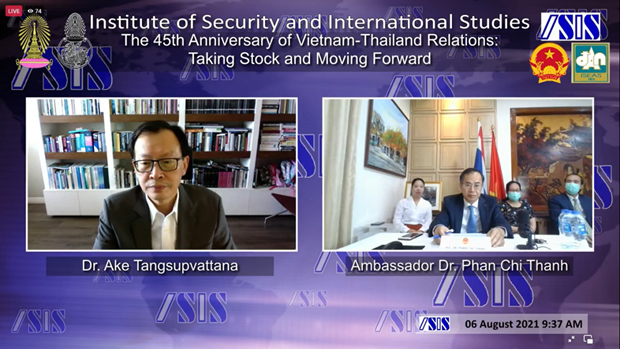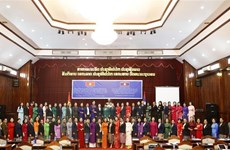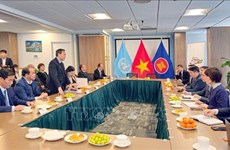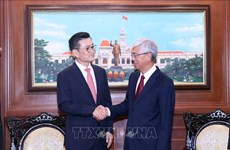Webinar looks back on 45-year-old Vietnam-Thailand relations
A webinar titled “The 45th Anniversary of Vietnam-Thailand Relations: Taking Stock and Moving Forward” was organised on August 6 on the occasion of the anniversary.
 Vietnamese Ambassador to Thailand Phan Chi Thanh (R) attends the webinar. (Photo: ISIS)
Vietnamese Ambassador to Thailand Phan Chi Thanh (R) attends the webinar. (Photo: ISIS)The webinar was jointly held by the Institute of Security and International Studies under Thailand’s Chulalongkorn University and the Centre for Southeast Asian Studies under the Vietnam Academy of Social Sciences.
At the event, scholars focused discussions on Vietnam-Thailand cooperation in all fields of politics - security, economy, trade, investment, culture, tourism, and people-to-people exchanges, as well as their close cooperation and mutual support at multilateral mechanisms and in regional and international issues of mutual concern.
They agreed that there are good prospects for economic and political collaboration, connectivity, labour, and climate change response between the two countries.
Addressing the webinar, Vietnamese Ambassador to Thailand Phan Chi Thanh affirmed that in recent years, the bilateral relationship has continuously developed in all fields. The two sides established a strategic partnership in 2013 and elevated it to an enhanced strategic partnership in 2019. The two countries have also agreed to increase high-level visits and consultations through existing bilateral mechanisms, such as the Political Consultative Group (PCG), the Joint Commission on Bilateral Cooperation (JCBC) and the Joint Cabinet Retreat (JCR).
In 2020, amidst the COVID-19 pandemic, the bilateral trade turnover still reached 16 billion USD, with Thailand currently being Vietnam's largest trading partner in ASEAN. The two sides set a target to increase two-way trade to 25 billion USD by 2025. Thailand is one of the top ten foreign investors in Vietnam with over 12.3 billion USD.
Regarding regional and global security and development issues, participants suggested the two countries continue to work with other countries in the region to maintain peace, stability and security in the East Sea, address differences and disputes through international law, including the 1982 United Nations Convention on the Law of the Sea (UNCLOS)./.












